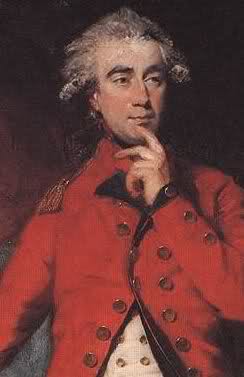| |
|
|
2nd
Lord Moira.
1754-1826
Francis Rawdon was born in 1754,
the son of the first Lord Moira, he spent his early years on his
fathers estate, Montalto near Ballynahinch
in County Down. Educated at Oxford University, he left without qualifying,
he joined the British army in America and was wounded in the battle
of Bunker's Hill, in the opening days of the American  War of Independence, 1775.in
the battle of Hopkirk's Hill, Lord Cornwallis said it was 'The
most splendid of the war' obviously a man with scant
regard for human suffering and life. Cornwallis was later given
the opportunity to demonstrate his military skills during the United
Irishmen's Rebellion of 1798. War of Independence, 1775.in
the battle of Hopkirk's Hill, Lord Cornwallis said it was 'The
most splendid of the war' obviously a man with scant
regard for human suffering and life. Cornwallis was later given
the opportunity to demonstrate his military skills during the United
Irishmen's Rebellion of 1798.
Francis Rawdon eturned to Ballynahinch
in 1791, where he had been elected in his absence to the Irish Parliament.
A member of the Whig party, he was opposition spokesman in the house
of Lords. He was an active campaigner for removing the injustices
against both Presbyterians and Catholics, which was fermenting a
revolutionary spirit in Ireland. He made public many of the excesses
of the British army in Ireland, which exacerbated the situation
in the events which led up to the 1798 rebellion. He had been approached
by Wolfe Tone to lend his
support to the movement for independence, Rawdon declined, the spectacle
of the French Revolution in 1789 was perhaps prominent in his mind.
He convened a meeting in the
market house in Ballynahinch, where he persuaded his tenants to
pass a resolution declaring their loyalty to the English crown.
Later in the House of Lords he declared that there was no town so
loyal as Ballynahinch, subsequent events were to prove that this
was far removed from the truth. A few short months later his home
and a large portion of the town were burnt down. Shortly after he
offered the estate for sale it was purchased in 1800 by Davis
Ker a successful merchant. Lord Moira moved to his English estate,
Donnington Park in Leicestershire (England) |
Lord Moira speaking in British
House of Lords in 1798.
Before my God and my country I speak of what I myself
have seen. I have seen in Ireland the most absurd as well as the most
disgusting tyranny that any nation ever groaned under. I have seen troops
sent full of this prejudice, that every inhabitant of that kingdom is
a rebel to the British Government. The most wanton insults, the most cowardly
oppression practised upon men of all ranks and conditions, in a part of
the country as free from disturbance as the City of London. Thirty houses
are sometimes burned in a single night, but from prudential motives I
wish to draw a veil over more aggravated facts.
In 1803 he became commander in chief
of the army in Scotland, the following year he married, and began building
a political career, utilizing his friendship with the Prince Regent. In
1806 he was appointed Constable of the Tower of London, in that year also,
he became a member of the Whig Cabinet, during this period he was acting
Grand Master of Masonry in London.
He moved to India and became Governor
of Bengal, as Governor he had responsibility for British Colonial interests
from Singapore to Suez. By now he was in his sixties, despite this he
led successful military campaigns against the Mahrattas in Central India
and the Gurkhas in Nepal, adding large tracts of land to the British Empire.
His campaign in Nepal eventually led to many of the Gurkhas joining the
British army, in which they served with honour and distinction for many
years.
Lord Moira left India in 1823, his
health failing, he served for a short time as Governor of Malta, he died
in Naples in 1826 at the age of 72. He left a letter asking that when
he died his right hand should be severed and sent to England to be buried
with his wife when she died.
|
|